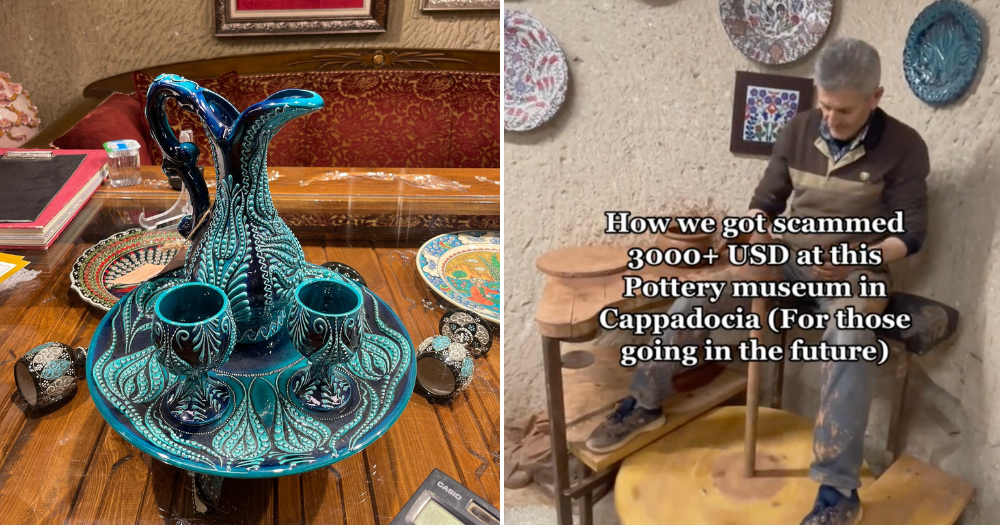Follow us on Telegram for the latest updates: https://t.me/mothershipsg
Two Singaporeans' holiday to Turkey ended on a sour note after they fell prey to an elaborate tourist trap purportedly set up by their guide and a local business.
The pair had travelled to Cappadocia, Turkey, in December 2021. One of them recently shared about their unsavoury experience on his TikTok account.
Mothership spoke to the TikToker, who prefers to be known only as Eclair.
Watch on TikTok
Trusted their guide
Eclair, who is 25 years old, shared in detail how the entire incident occurred.
He said that his friend booked a guided tour to sightsee around Cappadocia, which was arranged by the hotel they stayed in, called Hotel Argos.
Their research showed that the hotel had received good reviews. It is uncertain if it was part of the scam.
As part of the tour, a guide accompanied Eclair and his friend. The guide was apparently very amicable and knowledgeable, and for one to two days, he shared a myriad of stories and historical tidbits of the places they visited.
In his TikTok video, he described the man as a "master of believable storytelling".
Having spent this time with him, Eclair trusted the man to a certain extent, and "felt like he was a friend".
After spending a morning on a hot-air balloon ride, the group were on the way to their next destination when the guide "made a casual comment" that he would bring them to a pottery store.
The guide mentioned that the store charged in USD.
He described the store as having "top-grade" craftsmanship, and said their pottery pieces were unique and distinct from those typically seen in Turkish markets, which was why they were more expensive.
Claimed business was still suffering due to the pandemic
Upon arrival at the store, called Bezirhane Culture, Arts and Ceramics Center, the guide introduced Eclair and his friend to the family that owned the business.
The guide apparently claimed that he was very close to the staff in charge there, and that the two had a personal relationship. Thus, he said he would ensure Eclair and his friend get some discounts.
The staff then introduced the business, showed them how pottery was made in the back-of-house area, and served them apple tea.
Eclair said the store was "huge", and many tourists were milling about. The prices of the pottery apparently ranged from affordable to five-figure digits.
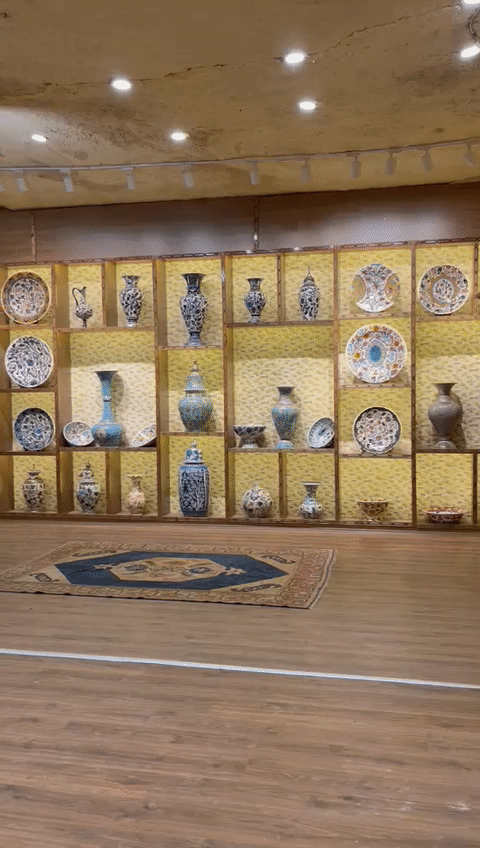 Video courtesy of Eclair
Video courtesy of Eclair
The staff there claimed that their traditional family business was suffering due to the Covid-19 pandemic, which led to a drop in tourists.
He also claimed that the business was struggling to pay some of their employees, and that he himself had not been paid in some time. If the business continued to decline, some of the older employees would apparently have to be laid off.
Guide 'negotiated' for lower prices
According to Eclair, the staff followed them around as they perused the items in the store.
Even though the pair were not keen to buy anything, the staff kept telling them that any amount would go a long way to help the business.
Eclair noted that the price tags were in Liras, the Turkish currency, and displayed the Liras symbol.
Since the two friends had been paying in Liras throughout their trip, they believed that the prices would be converted to USD upon checkout.
They decided to each purchase a set of pottery.
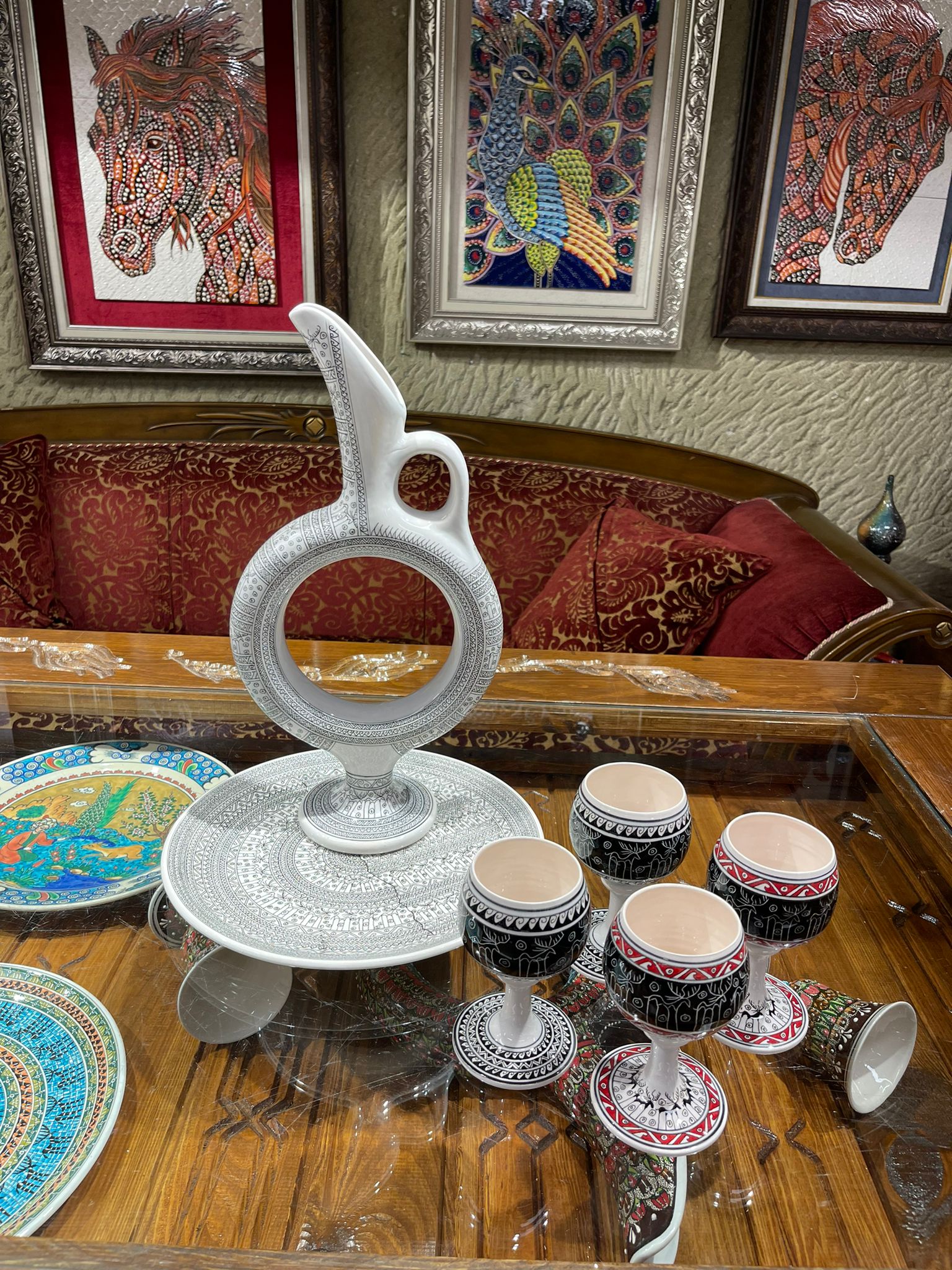 Photo courtesy of Eclair
Photo courtesy of Eclair
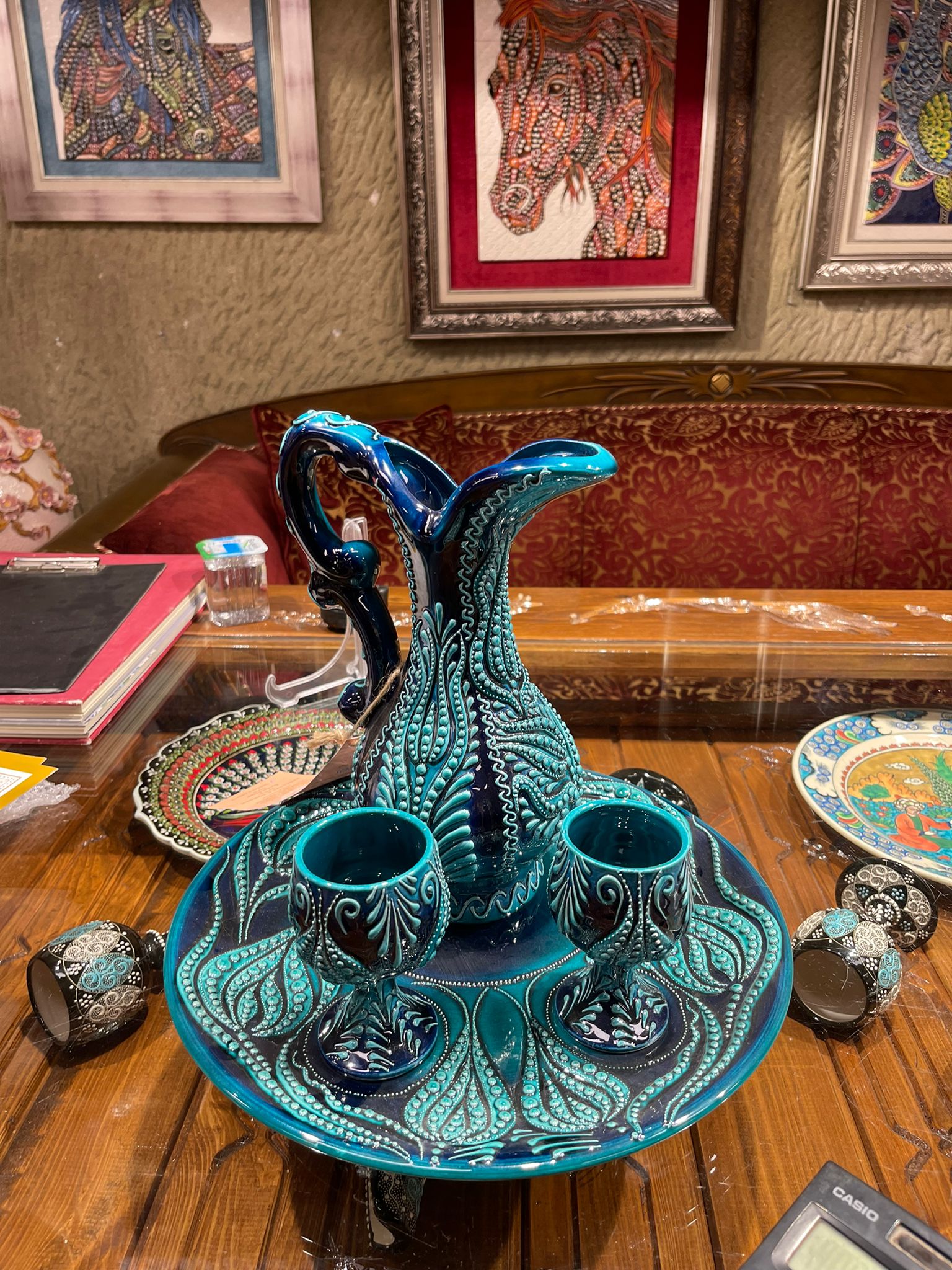 Photo courtesy of Eclair
Photo courtesy of Eclair
Eclair noted that when staff looked at the price tag, they only read out the numbers, and did not mention the currency.
The guide then told them that with his good relationship with the staff there, he would help them ask for a better price.
He then proceeded to negotiate with the staff in Turkish for the next five to seven minutes, following which Eclair and his friend were told that the guide had managed to get a 20 to 30 per cent discount.
There was even a tourist nearby that chimed in that it was "good deal". Eclair posited that this person might have been planted.
The staff even decided to throw in some additional cups free of charge, and said they would engrave their names at the bottom of the items, and issue a "certificate of authentication".
Staff also said that the pottery pieces would be shipped to their doorstep for free and that they would not have to haul the pieces back in their luggage.
Charged the amount in USD
After some contemplation, the pair decided to buy the items, and passed the staff their credit card.
They believed that they were paying 2480 liras -- which should be around S$264 according to the exchange rate last year -- for the pottery.
It was only after they were handed the receipt that they realised they had been charged a different amount, and remembered the guide's previous passing comment that prices in the store were in USD.
A record of the transaction Eclair provided showed that the staff had converted the amount to USD and charged them 28,350 liras. They thus ended up paying S$3,338.
 Photo courtesy of Eclair
Photo courtesy of Eclair
Eclair said he was shocked by the turn of events, but did not want to make a scene as there were many tourists in the store.
"After that, our guide even told us that it was a good purchase... we felt the pain, but we just brushed it aside and were rushed off to the next destination."
Eclair's friend later tried applying for a refund with the credit card company, but was unsuccessful as he had already signed the receipt.
By that time, the pottery had already been delivered to the friend's address in Singapore.
Store had some bad reviews
The next day, the pair left Cappadocia for Istanbul. Eclair shared that he felt curious about the store and decided to do some research.
It was only then that they realised the store had received a number of negative reviews.
When Mothership checked out the store's Google reviews, it had a high rating of 4.4 stars from 610 reviews.
However, interspersed among the positive reviews are some slamming the store for their lack of ethics in scamming tourists.
Some complained that the pottery was overpriced.

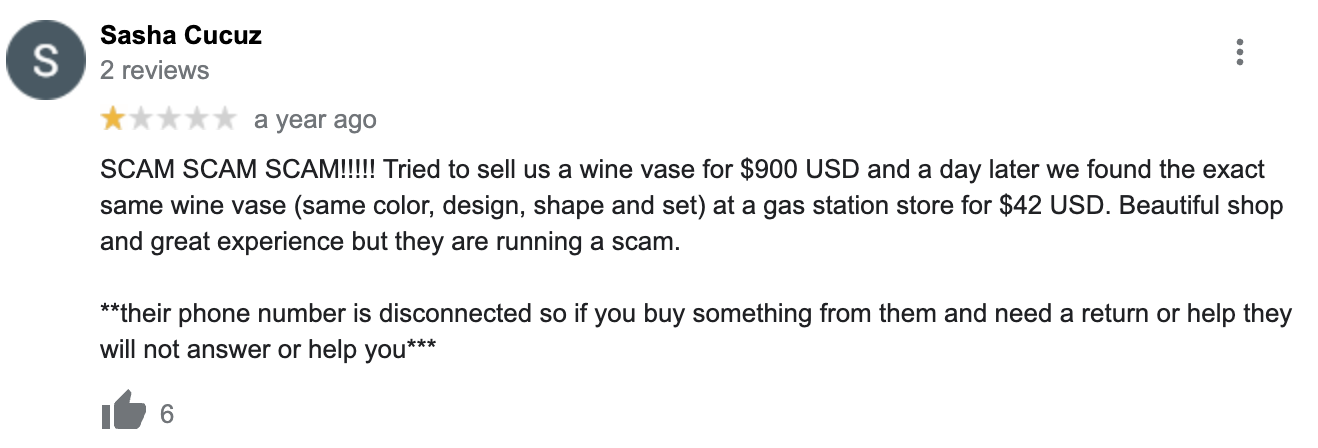
Others pointed out the same problems Eclair and his friend encountered — that the pottery was priced in USD instead of Liras.

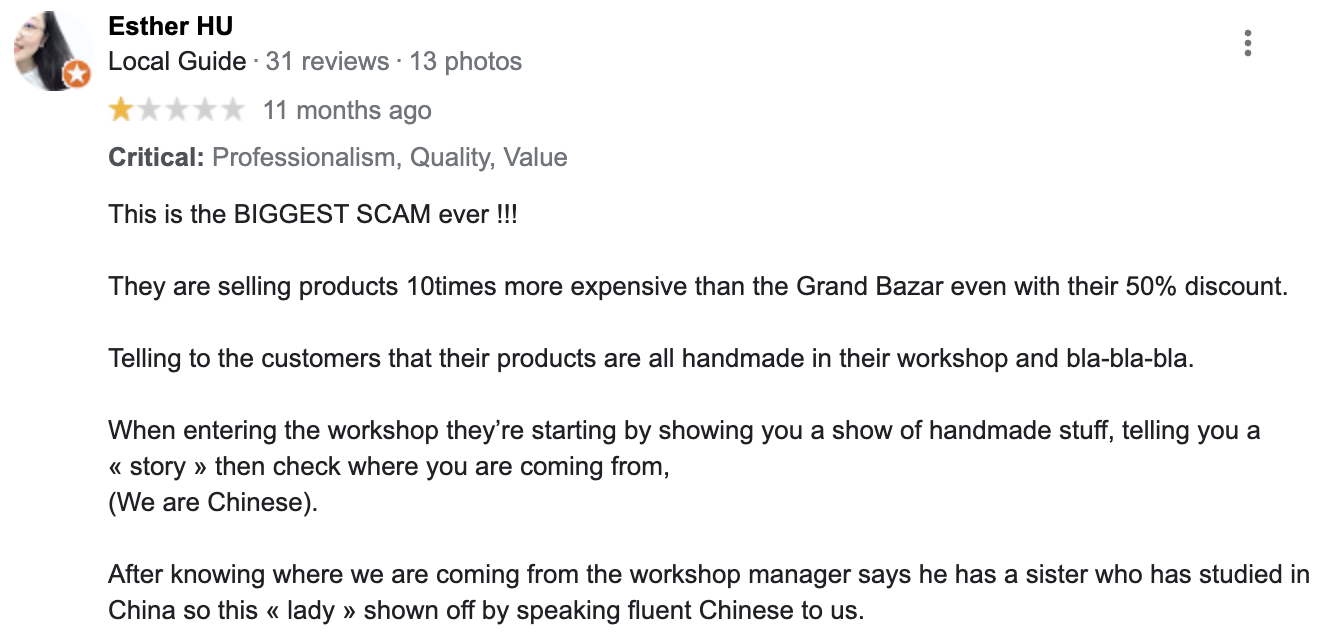
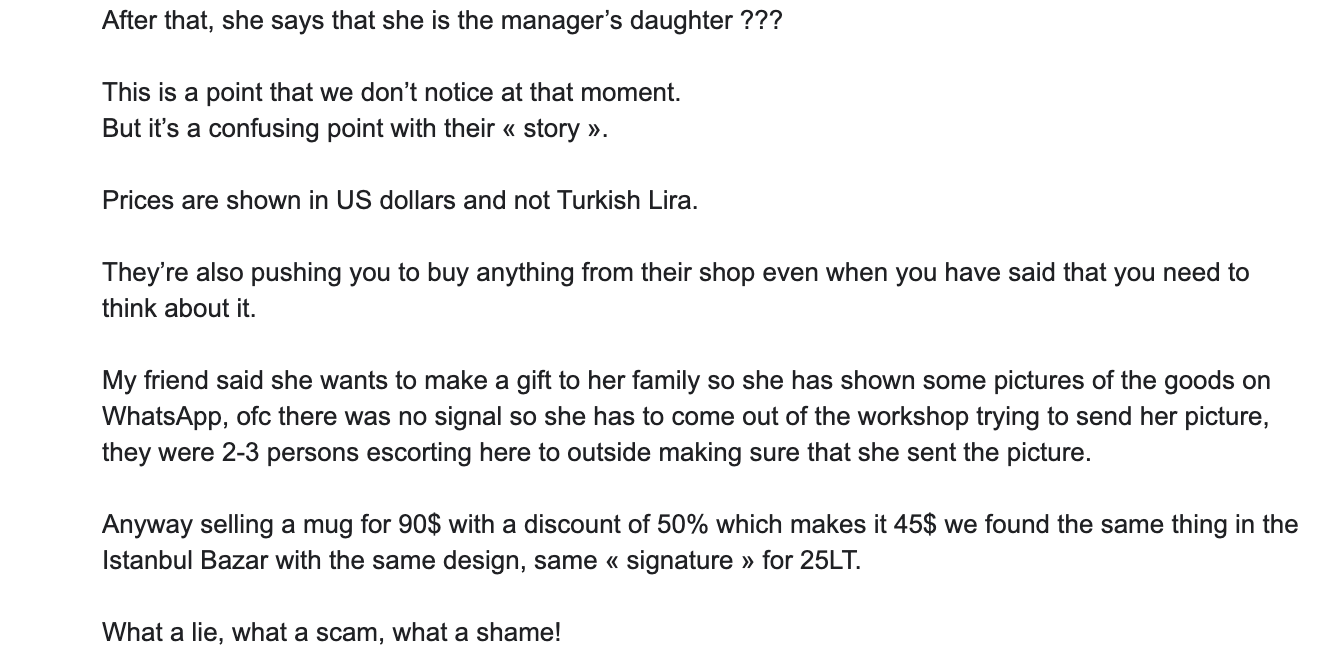
Reviews on the TripAdvisor page on the store contain numerous similar negative sentiments.

Pottery they bought could be commonly found
Upon reaching Istanbul, Eclair and his friend realised that pottery of a similar make to the ones they bought can be found in abundance at the markets.
In fact, the ones at the markets were as cheap as five per cent of the amount they paid, Eclair estimated.
"Our only mistake was going to Cappadocia directly from France before Istanbul. If not we would have seen all of [the pottery]."
Since Eclair shared about how he and his friend were scammed on his TikTok account on Sep. 6, the video has garnered nearly 290,000 views.
He revealed that the ceramic store had reached out to his friend recently to ask for Eclair's contact.
Eclair presumes that they wish to contact him to ask him to take the TikTok video down.
 Photo courtesy of Eclair
Photo courtesy of Eclair
In the comments section of his TikTok video, Eclair admitted that he and his friend were naive and ended up getting scammed, but he had wanted to shed light on the Turkish store's unethical business practices.
Reflecting on the incident, he told Mothership that he feels that travellers should be more aware and cautious when visiting countries with different cultures and practices.
He believes that due to the impact of the pandemic, companies "have more self-interest to recoup their losses at the expenses of travellers".
However, he opines that such tourist traps can occur in any country.
"Despite an unpleasant personal experience, I still feel that Cappadocia is a beautiful destination and not all Turkish businesses and people are like this. I don’t think people should be deterred from going there just because of such unpleasant incidents."
Top photo courtesy of Eclair
If you like what you read, follow us on Facebook, Instagram, Twitter and Telegram to get the latest updates.
